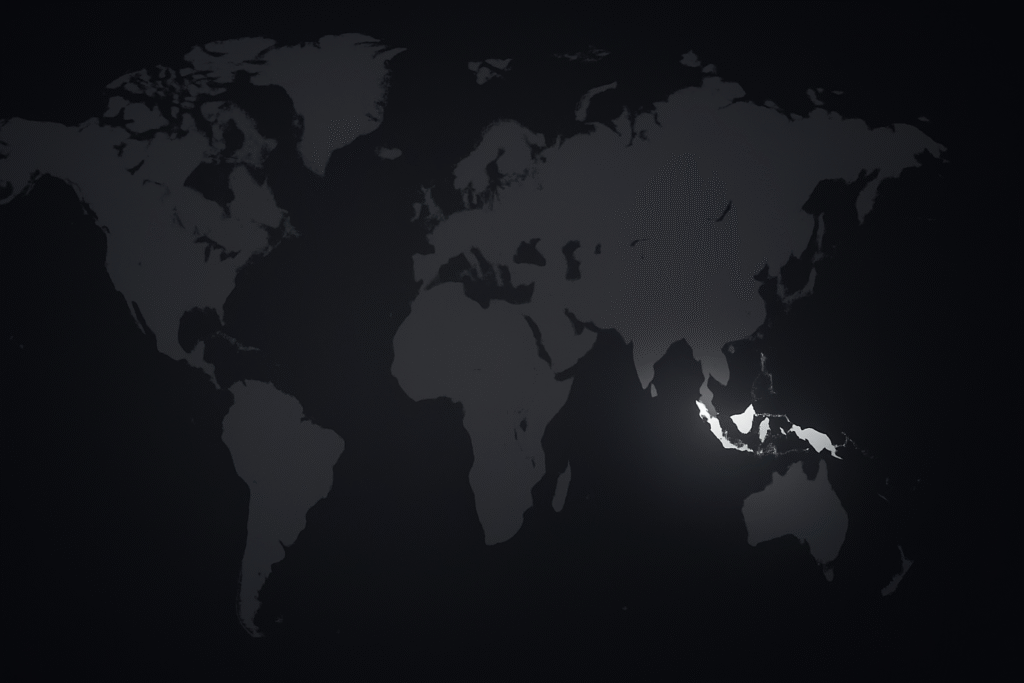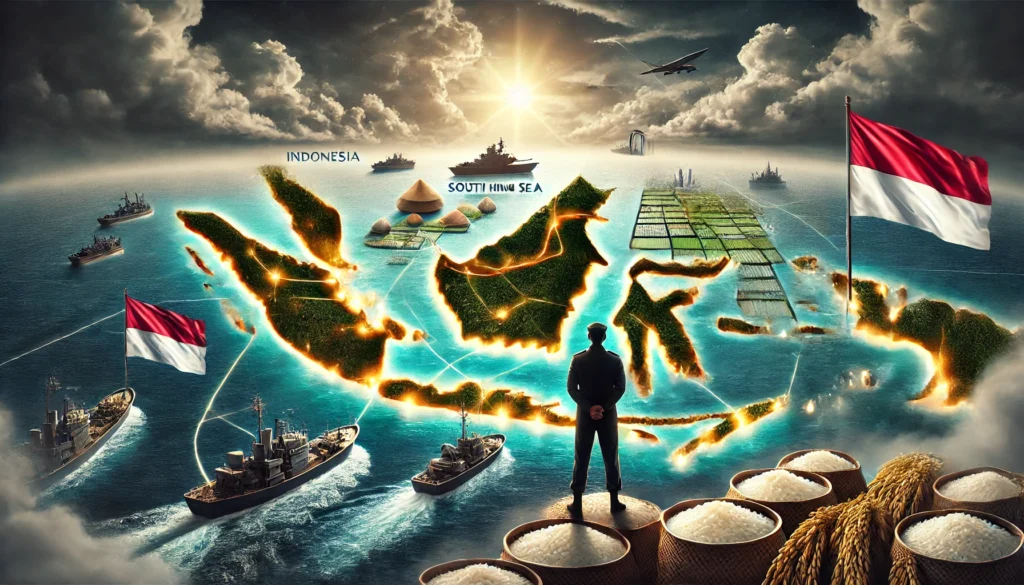- The Black Swan Strategy: How Indonesia Must Position Itself in the Global Power Play

Maybe the game isn’t about winning in normal times. It’s about thriving when the world is burning.
A Black Swan is not just any shock—it’s the kind of event no one sees coming until it’s already rewriting the rules. The 2008 financial collapse, COVID-19, the Russia-Ukraine war, even AI’s recent acceleration—none were expected in form, but all changed the global order. These aren’t just events; they are power transfer mechanisms. And the truth is, power doesn’t vanish—it moves. The only question is: are you positioned to catch it?
From Playing Defense to Engineering Resilience
For decades, Indonesia has played defense—reacting to volatility, not mastering it. But a new strategy is emerging. One that doesn’t try to predict the next crisis, but instead builds sovereign resilience into the architecture of the state. It begins by rethinking what truly matters when the global system buckles: control over food, energy, capital, and narrative. These are not buzzwords. These are survival assets in disguise. And if mobilized properly, they form a national advantage.
- Food and Energy Are Power Assets—Not Just Commodities
That’s why Indonesia must start where most macroeconomists end: real assets, not theoretical projections. Food and energy are not just commodities—they’re geopolitical weapons. In a world where supply chains collapse, who feeds and powers the region controls the game. That’s why we must treat rice, palm oil, fisheries, gas, and coal not as exports, but as leverage. We need sovereign control from port to plate, from well to wire. And we must embed this logic inside Danantara—not as a CSR side-show, but as a strategic capital mandate.
- Capital Is the Weapon—If You Know How to Use It
The second axis is capital itself. Budgets are rigid. But capital—if governed right—is a weapon. During a crisis, budgets freeze. But sovereign capital moves. That’s why Danantara must not act like a passive investment vehicle. It must evolve into a war room of capital orchestration. This means treating capital deployment like wartime triage: investing in what’s resilient, pulling out from what’s fragile, and redeploying instantly as new threats or opportunities emerge. It means abandoning the GDP optics game and focusing instead on resilient cashflow, strategic asset control, and long-term economic sovereignty.
- Watch the World. Wait. Then Strike.
Third, we must monitor the world for cracks—not with fear, but with intent. A Black Swan doesn’t destroy value. It reveals who was swimming naked and who kept reserves. In every crisis, assets fall to discounts. Companies, ports, farmland, entire supply chains go on sale. Indonesia must build a “Crisis Arbitrage Playbook,” backed by a sovereign liquidity buffer, so that when others are forced to sell, we become the buyer. Not just for gain, but for positioning. That is how nations build wealth during collapse—not after recovery.
Focus Over FOMO – Keep Well Positioned Untill The Black Swan Emerges
Resilience isn’t just about preparation. It’s about focus. Indonesia must not fall into the trap of chasing every global trend. In a noisy world—where FOMO drives policy—it takes discipline to stay still. While others bet on hype cycles—overfunded EV startups, burning AI valuations, flashy ESG tokens—we double down on fundamentals. We prioritize what survives any collapse: food, energy, water, mobility, and talent. That’s the real portfolio of the future. Not unicorns, but utilities.
And when the time comes—and it will come—the Black Swan will not announce itself. It will be sudden. Uncomfortable. Confusing. That is the moment of truth. Not for panic. But for deployment. At that precise moment, nations without strategy will freeze. Their capital will be trapped. Their leaders will hold emergency meetings. Meanwhile, Indonesia—if we prepare now—will already have the playbook ready: whom to call, what to buy, how to act. We become the lender, the feeder, the buyer, the port. We don’t just survive the storm—we profit from its disorder.
Perception Is Power: Win the Narrative, Win the Game
But perhaps the most underrated weapon in a Black Swan event is the narrative itself. In global chaos, perception becomes currency. If Indonesia is to rise, it must not only act—it must be seen as the nation that was prepared. That means owning the story: crafting a public doctrine of strategic capital, publishing a Sovereign Resilience Index, and showing the region that we didn’t just ride out the storm—we were designed for it. Narrative attracts talent. It moves capital. It builds reputation. And it can even shape foreign policy.
The Ultimate Question: Will We Be Shocked—or Ready?
In the end, the question is not whether the next Black Swan will come. It’s when—and who benefits. Indonesia does not need to know the form of the crisis. We only need to build our state architecture around volatility. Food and energy must be secured. Capital must be orchestrated like a war general, not a bureaucrat. Global cracks must be watched not with worry, but with readiness. And above all, we must tell the world: we are not afraid of collapse. We were made for this.
- What President Prabowo Sees That Others Don’t: Indonesia’s Hidden Food Strategy for Power

Why is President Prabowo Focusing on Food Security? Most people see President Prabowo’s food security push—especially his free nutritious meal program (MBG)—as a social welfare initiative. But what if it’s something much bigger? What if it’s actually a long-term military and geopolitical strategy to position Indonesia as a regional powerhouse?
This strategy isn’t just about improving student nutrition. It’s about ensuring Indonesia’s survival and influence in a world where food could become the most valuable resource in times of crisis.
The U.S. WWII Playbook: How Logistics Made America a Superpower
During World War II, the United States didn’t jump into the war immediately. Instead, it became the logistics supplier for warring nations. Through the Lend-Lease Program, the U.S. provided weapons, fuel, and—most importantly—food to the UK, USSR, and China.
The result?
- The U.S. received massive payments in gold, eventually controlling two-thirds of the world’s gold reserves by the end of the war.
- It emerged as the world’s dominant economy, creating the Bretton Woods system that made the U.S. dollar the global reserve currency.
- While European nations were destroyed by war, the U.S. remained untouched and became the world’s factory and financier.
The key lesson? Wars are not won by brute force alone—they are won by logistics, food, and supply chains.
The Coming South China Sea Conflict: Indonesia’s Strategic Opportunity
Many experts believe that if a major war breaks out, it will be in the South China Sea—a region crucial for global trade.
- China is expanding aggressively, seeking full control over vital shipping lanes.
- The U.S. and its allies are pushing back to maintain a balance of power.
- ASEAN nations, including Indonesia, are caught in the middle—but Indonesia has a unique opportunity to play a different game.
If war happens, food will become a weapon. Nations engaged in war will struggle to produce enough food, leading to skyrocketing demand. Countries that can supply food will not just survive but thrive.
Indonesia’s Food Strategy: A Military & Economic Masterstroke?
This is where President Prabowo’s food security vision could be part of a bigger geopolitical play.
- National Security: A country that depends on food imports is vulnerable. In a global crisis, food shortages can cause social unrest and economic collapse.
- Wartime Economics: Just like the U.S. in WWII, Indonesia could remain neutral and profit massively by becoming the primary food supplier for warring nations.
- ASEAN’s Logistics Hub: With its strategic location and vast agricultural potential, Indonesia could transform into the “food arsenal” of Asia, much like how the U.S. was the “arsenal of democracy” during WWII.
What does this mean in practical terms?
- If a South China Sea conflict occurs, Indonesia can sell food at premium prices to war-affected nations.
- If the world experiences economic turmoil, a self-sufficient Indonesia will be resilient while others struggle.
- By securing food logistics today, Indonesia is future-proofing itself for any global crisis.
The Role of the Free Nutritious Meal Program: A Wartime Preparation Strategy?
President Prabowo’s free nutritious meal program is often seen as a social welfare project, but it may serve a greater strategic purpose in the event of war or economic crisis.
- Ensuring students are fed in wartime: If war disrupts supply chains, students must still receive meals to maintain social stability. A population that continues to be educated and well-fed is a population that can endure long-term crises.
- Easing the burden on families: In times of crisis, food scarcity puts massive stress on families. A guaranteed meal program lightens the load on parents, ensuring that children’s health and education are not compromised.
- Testing national logistics: The program also serves as a training ground for Indonesia’s food distribution system—if a wartime emergency arises, the government will already have an operational food supply network in place.
In essence, this initiative is not just about child nutrition—it’s a logistical war game for national survival. If war happens, Indonesia won’t just feed its children; it will have the tested infrastructure to keep the entire nation sustained.
Conclusion: Indonesia’s Path to Power Through Food
While many see food security as just an economic or social issue, history shows that food is a strategic asset in times of war.
- The U.S. became a superpower by supplying food and logistics in wartime—Indonesia can do the same in Asia.
- If war erupts in the South China Sea, Indonesia’s best move is not to fight but to supply.
- Food is the new gold—and Indonesia has the potential to control the regional supply.
- The free nutritious meal program is not just social policy; it’s a strategic move to keep Indonesia prepared for crises, ensuring its people remain strong and stable.
Having the president which was a general and an experienced military strategist, without shadow of a doubt Indonesia can turn food security into geopolitical power.